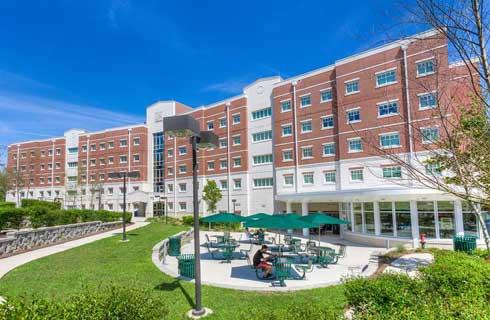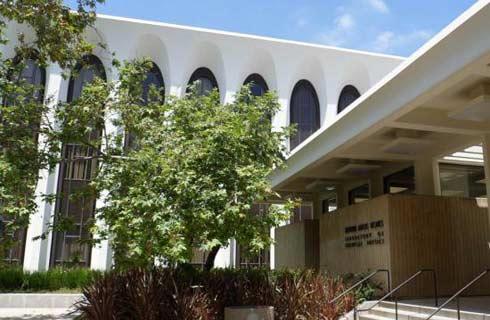行为神经科学哲学博士
Doctor of Philosophy in Behavioral Neuroscience

学历文凭
Ph.D.

专业院系
Department of Psychological Sciences

开学时间

课程时长

课程学费

国际学生入学条件
Applicants must have at least a baccalaureate degree at the time they will begin the program.
Grade Point Average: Minimum of 3.0 on 4.0 scale.
Proof of English proficiency
Minimum requirements vary by department. It is recommended that students have a 79 TOEFL, 6.5 IELTS, or 53 PTE-A
IDP—雅思考试联合主办方

雅思考试总分
6.5
- 雅思总分:6.5
- 托福网考总分:79
- 托福笔试总分:160
- 其他语言考试:PTE (A) - 53
CRICOS代码:
申请截止日期: 请与IDP联系 以获取详细信息。
课程简介
The doctoral (Ph.D.) program in Psychology with an emphasis in Behavioral Neuroscience (BN) involves course work on the biological basis of behavior and scientific inquiry . It also has an apprenticeship model in which each student works closely and continuously with a faculty member within the realm of the faculty member's research interests. This work will result in an empirical research thesis and an empirical research dissertation. After completing two years in the program, students must pass written and oral exams to continue in the program. Students are also required to complete a specialty paper for publication. The Ph.D. program is 60 credit hours.<br>Upon completion of the degree, graduates of the Ph.D. in Psychology, Behavioral Neuroscience program at UM-St. Louis will be able to:<br>Goal 1. Demonstrate an integrative understanding of psychological concepts, theories, research, and historical trends in Behavioral Neuroscience and apply this knowledge in research and teaching. (Psychological Science Knowledge Base)<br>Goal 2. Explain and apply the scientific method using a variety of research paradigms to solve problems in Behavioral Neuroscience and articulate how the solutions rely on scientific reasoning. (Critical Thinking)<br>Goal 3. Evaluate, identify, and apply appropriate research methods in Behavioral Neuroscience, including research design, data analysis (i.e., selecting, conducting, and interpreting basic statistical tests) and data interpretation. (Scientific Inquiry)<br>Goal 4. Communicate using a variety of written and oral formats (e.g., papers in the format specified by journal or granting agency, oral research presentations, posters for research at conferences, grant applications, professional publications) in a clear, concise way. (Communication)<br>Goal 5. Evaluate and apply ethical principles to Behavioral Neuroscience research and teaching according to national and international standards, while adopting social and ethical values that build community at local, national, and global levels (Ethical and Social Responsibility)<br>Goal 6. Demonstrate self-reliance and independence in initiating a program of research and carry out research projects from design to dissemination. (Professional Development, Scientific Inquiry)<br>Goal 7 . Display professionalism and ownership of professional growth and learning through an evolving career development plan tailored to one's accurate self-assessment of abilities, achievements, motivations, and work habits. (Professional Development)
相关申请
 预科
预科 奖学金
奖学金 实习机会
实习机会 在校学习
在校学习 跨境学习
跨境学习 校园授课-线上开始
校园授课-线上开始 在线/远程学习
在线/远程学习
开学时间&学费
学费信息仅供参考,请与IDP联系以获取详细信息
| 开学时间 | 时长 | 学费 | 地点 |
|---|
本校相关课程

性别研究研究生证书
学历文凭
Graduate Certificate
开学日期
课程费用总额


中学教学证书研究生证书
学历文凭
Graduate Certificate
开学日期
课程费用总额


非营利组织管理与领导力研究生证书课程
学历文凭
Graduate Certificate
开学日期
课程费用总额


营销管理研究生证书
学历文凭
Graduate Certificate
开学日期
课程费用总额


物流与供应链管理研究生证书
学历文凭
Graduate Certificate
开学日期
课程费用总额


人力资源管理研究生证书
学历文凭
Graduate Certificate
开学日期
课程费用总额

其他相关课程

Certificate in Applied Behavior Analysis
 德克萨斯农工大学学院站分校
德克萨斯农工大学学院站分校学历文凭
Graduate Certificate
开学日期
课程费用总额


Master of Science in Behavior Analysis
 塞勒姆州立大学
塞勒姆州立大学学历文凭
Masters Degree
开学日期
课程费用总额


Doctor of Philosophy in Psychology - Systems and Behavioral Neuroscience
 弗吉尼亚大学
弗吉尼亚大学学历文凭
Ph.D.
开学日期
课程费用总额


Master of Public Health (Traditional) - Social and Behavioral Sciences
 佛罗里达大学
佛罗里达大学泰晤士高等教育世界大学排名:136
学历文凭
Masters Degree
开学日期
课程费用总额


行为科学文学士学位(迪尔伯恩)
 密歇根大学安娜堡分校
密歇根大学安娜堡分校学历文凭
Bachelor Degree
开学日期
课程费用总额


跨学科研究应用科学学士学位-人性
 湖首大学
湖首大学泰晤士高等教育世界大学排名:1080
学历文凭
Bachelor Degree
开学日期
课程费用总额











